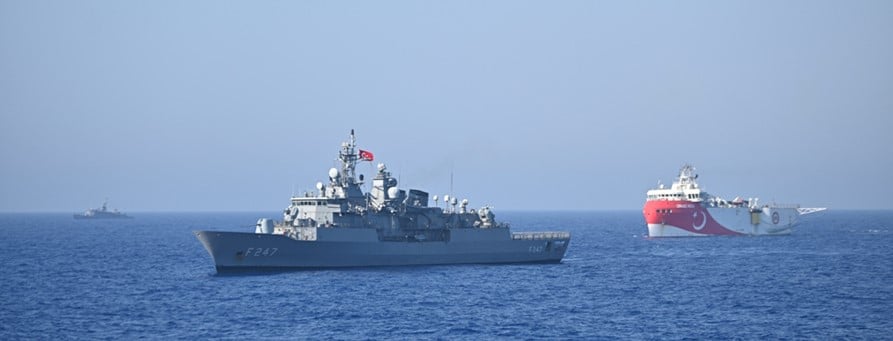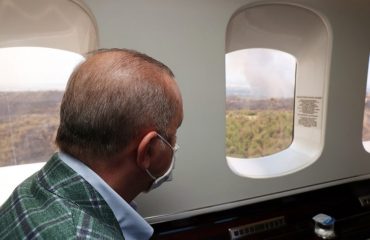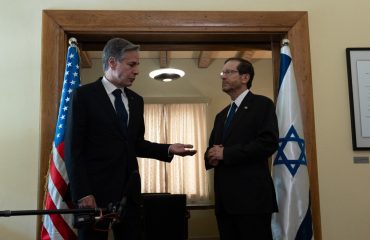

Turkey is the principal actor in the Eastern Mediterranean as it holds the longest coastline in the whole Mediterranean Sea and therefore the gateway to the Black Sea, Russia and the north. Its counterpart is not Greece, but Egypt, which holds the gateway to the Red Sea and the Indian Ocean.
Failing to overcome Italy, its historic rival in Libya, (thanks to Turkey and Qatar), France is now trying to stick to the Eastern Mediterranean by backing the Greek plan to lock Turkey to its narrow coastline after its i930s model design in Lebanon collapsed with the recent explosion. French leader Emmanuel Macron, who posted holiday photos on a jet-ski, looks neither convincing nor deterrent when sending an aircraft carrier for a drill with the Greek navy.
So Turkish efforts to stand for its rights in energy source at its gate, but France holds such rights at 2,300 kilometers of air distance or 2,600 kilometers via sea, huh?
In addition, the German newspaper Die Zeit’s report addressing potential tourists to Turkey, saying that “do not go to Antalya, war may break soon”, shows the extent of the pressure on Turkey. President Tayyip Erdoğan’s regional policy impasse is not the Eastern Mediterranean, but any step back without consensus can lead to serious loss of rights.
Syria or Libya?
Erdoğan did wrong by intervening in the Syria civil war but with a 913-kilometer border to its troubled neighbor, Turkey couldn’t have turned a blind eye to that war either. It could not do so because of the migrants, terrorism and international trade dimensions of the issue. Not its involvement itself but the method of intervention, which was setting the goal as overthrowing the government in its neighbor, was wrong. Now we are all facing the consequences. But the steps that Erdoğan should take for a resolution in Syria are also clear, he does not face an impasse there.
Unlike the Syria case, the Turkish government picked the U.N.-recognized government as its interlocutor in Libya.
In fact, Turkey’s actions on Libya, led Greece to try to limit Turkey’s entry to the Mediterranean Sea with a 100-line between the islands of Rhodes and Castellorizo (Meis). But the situation in Libya has changed with Turkey’s engagement. The government of Fayez al-Sarraj, which was expected to be wiped out of the field in a few weeks, is now waiting for its supporters to put rebel Khalifa Haftar on the table. It suggests that the U.S. oil export port of Sirte (currently in Haftar’s hands) be demilitarized. Everything is okay as long as the oil continues to flow. On the other hand, Turkey has things to gain from energy to infrastructure if it achieves success in this line of policy. In other words, we cannot talk about a Libya dilemma for Erdoğan but a sustainability problem.
Erdoğan’s dilemma lies deeper
U.S. Secretary of State Mike Pompeo announced on August 13 that Israel and the United Arab Emirates (UAE) signed a normalization agreement on its efforts. (on the same day Greece thanked Israel for lending it Heron unmanned aerial vehicles. Israel’s goal is different from France or Greece: It is forcing Turkey to make peace again but under its own conditions.) Turkish Foreign Ministry, meanwhile, has accused the UAE, a country that emerges under every issue against Turkey, of throwing Palestine under the bus.
UAE Crown Prince Mohammed bin Zayed (aka MBZ in international politics) and Saudi Crown Prince Mohammed bin Salman (or MBS) support every move against Turkey. The presence of a religious president, Tayyip Erdoğan, in power, and the Islamist roots of the ruling Justice and Development Party (AKP) do not hold them back. Egypt, is Turkey’s prime competitor in the Eastern Mediterranean, the Middle East and Libya. Egypt and Saudi Arabia had already backed the coup by Abdel Fattah Sisi, who overthrew elected president Mohamed Morsi, who had built a good relationship with Turkey. Kuwait and Bahrain also stand with them.
Highborn nations’ Turkey allergy
Every time Erdoğan tries to tell the people in Turkey that the Middle Eastern people miss the Ottoman rule, anti-Turkey stance of the Arab administrations grows.
Erdogan’s dilemma is trying to lead the Muslim world on one hand, and on the other hand, he is being perceived in the Arab –the self-claimed “highborn people”– as a Turk, whose ancestors ruled them with a sword for four centuries. Sunni Arabs indifference to the re-opening of Hagia Sophia to worship as a mosque, and even their reaction against Erdoğan’s move to look nice to the West, should have hurt Erdoğan the most. The Sunni Arab tribes had invited the British and the French to the Middle East against Turkey and thanks to them (and oil) through they established their states. Today, their cooperation with the West against Turkey, and even with Israel despite the fact that they used to condemn Turkey for keeping diplomatic ties with it at the time, is not surprising. Keeping Libya and Qatar because of current common interests, what unites the Arabs today is no longer an anti-Israel but an anti-Turkey stance. What is surprising is that Erdoğan does not want to see this. Because at this point, Erdoğan’s ideology contradicts with his policy. That’s why this is Erdoğan’s biggest dilemma.

